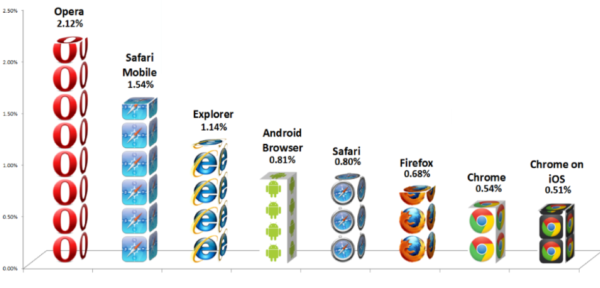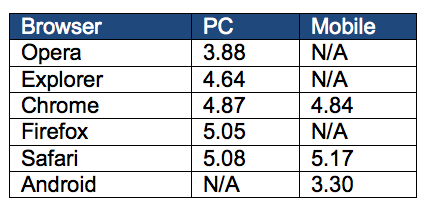Report: Mobile Safari Users Generate More Clicks, Longest Queries
Ad network Chitika provided us with some interesting data comparing click through rates (CTRs) and query lengths on the various desktop and mobile browsers based on millions of impressions on its network. It found that Opera (PC) browser users clicked-through more often than other browser users. Opera users are generally regarded as less mainstream and […]
Ad network Chitika provided us with some interesting data comparing click through rates (CTRs) and query lengths on the various desktop and mobile browsers based on millions of impressions on its network. It found that Opera (PC) browser users clicked-through more often than other browser users.
Opera users are generally regarded as less mainstream and more tech-savvy than other browser users (e.g., Explorer) so it’s curious that Opera’s CTR would be highest. Next in line after Opera but ahead of all other browsers, PC or mobile, is mobile Safari with a 1.54 percent CTR.
Chitika told me previously that it’s confident these mobile clicks are intended and not a product of the so-called “fat finger problem.” The full browser-CTR list is below.
Average CTR by browser
Source: Chitika
The following are aggregated average CTRs across platforms in the US and Canada:
- All U.S. and Canadian Desktops: 0.85 percent
- All U.S. and Canadian Mobile Phones: 1.07 percent
- All U.S. and Canadian Tablets: 1.06 percent
Chitika also took a look at average search query lengths for each of the browsers. Safari users (PC and mobile) formulated longer queries, on average, than other browser users. In this case Android browser users generated the shortest queries. It’s a bit of a challenge to explain why Android users would formulate the shortest queries and mobile Safari users the longest.
Average search query length by browser (words per query)
Source: Chitika
One might be tempted to say “Siri” or speech to explain the discrepancy. However Android handsets also have voice search. So the explanation isn’t voice search or speech by itself.
Opinions expressed in this article are those of the guest author and not necessarily MarTech. Staff authors are listed here.
Related stories

